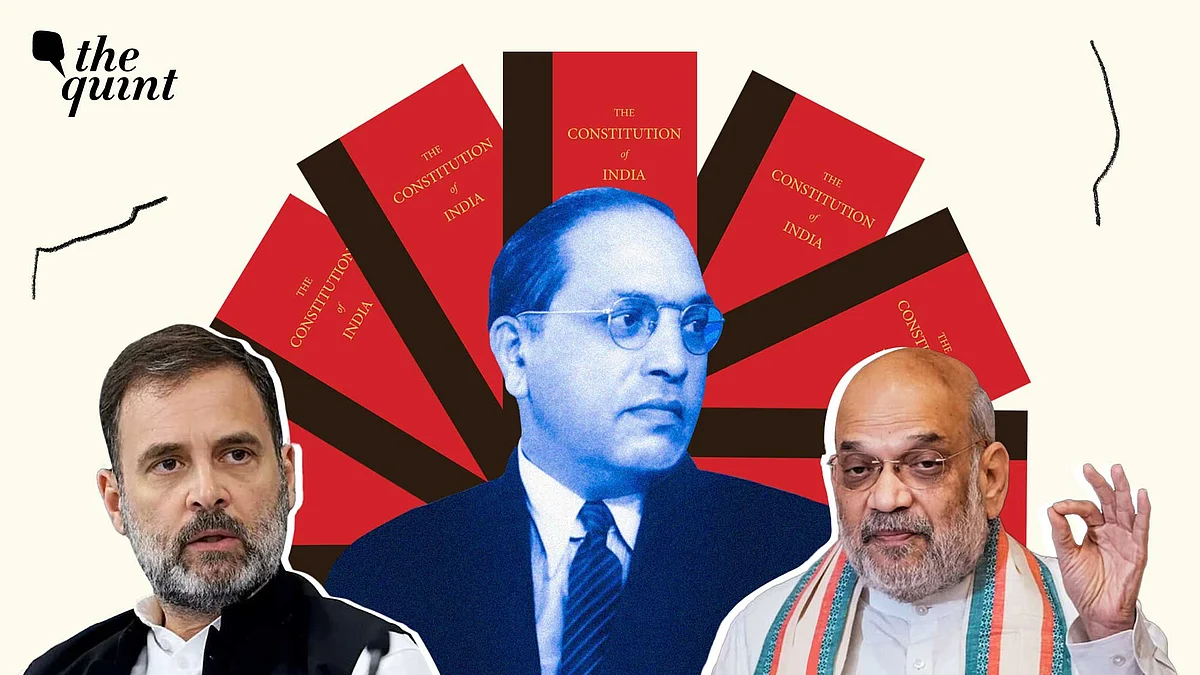
Invoking BR Ambedkar Doesn't Fix a Flawed Constitution
Ambedkar had a different vision for India’s Constitution and didn't fully support the one adopted by the Assembly.

advertisement
Recently, India's Parliament debated whether the country’s 74-year-old Constitution is still effective and being followed. However, the discussion quickly devolved into mudslinging. Congress leader Rahul Gandhi presented a list of alleged Constitution violations by the BJP government, while Prime Minister Modi responded by highlighting numerous violations during the tenures of Congress leaders Jawaharlal Nehru and Indira Gandhi.
The so-called debate was dull and unproductive, but it triggered violence in Parliament and sparked a nationwide controversy when both sides invoked B.R. Ambedkar, the chief architect of the Constitution. Rahul Gandhi quoted Ambedkar’s famous 1950 remark: "If there is no social and economic equality… political equality will be destroyed."
In response, Home Minister Amit Shah remarked, "It has become a fashion to say Ambedkar, Ambedkar, Ambedkar... If they (Congress) had mentioned God's name as often, they would have earned a place in heaven." This comment led to widespread outrage, with opposition parties accusing Shah of insulting Ambedkar.
Parties' Need to Invoke BR Ambedkar
The incident may be irrelevant to evaluating the Constitution’s merits, but it exposes an ugly truth in India’s politics. Political parties across the spectrum use Ambedkar's name to win over Dalit votes, which make up about 17 percent of the population. These parties portray Ambedkar—still the most revered Dalit leader—as a God-like figure who created India’s Constitution, which they imply is sacred and flawless. Each party seeks to convince Dalits that it is the primary defender of Ambedkar's legacy and, by extension, their chief benefactor.
In India’s fragmented political landscape, the Dalit vote is so crucial that it has created a no-win situation for the country. India could achieve much greater progress if it were open to debating and addressing the flaws in the Constitution. However, anyone who dares to criticize the document is unlikely to gain political power.
The irony is that this deadlock harms Dalits the most, as they remain one of the most oppressed groups in a highly centralized system created by our Constitution. Yet, for years, all parties have told Dalits that Ambedkar’s Constitution is the best and should remain untouched.
BR Ambedkar Didn't Really Agree With Nehru's Constitution
Dalits need to understand that Ambedkar didn’t actually create the Constitution in the sense of determining its fundamental structure and provisions—Nehru did. Ambedkar was appointed Chairman of the Drafting Committee by the Constituent Assembly, which was controlled by Congress, with Nehru as its undisputed leader. Over the years, several books and articles have shown that it was Nehru who shaped the Constitution’s core framework. In his 1997 book Worshipping False Gods: Ambedkar and the Facts Which Have Been Erased, Arun Shourie detailed how Ambedkar’s role was mainly to implement the Assembly’s decisions. Sudheendra Kulkarni has also written extensively on this, including in his 2024 article, "Who Contributed More to the Constitution and Its Preamble? Nehru, Not Ambedkar." He wrote, “The essence of the Preamble and most other defining features of the Constitution came from the Congress—mainly from Nehru.”
In my 2016 article, “Ambedkar’s ‘United States of India,’” I outlined his vision, which he presented to the Assembly’s Subcommittee on Fundamental Rights just seven months before being appointed to the Drafting Committee. Ambedkar proposed that India should become a U.S.-style federation and have a constitutional structure with many similarities to the American Presidential system, including a fixed-term executive.
I have previously discussed why Ambedkar rejected Nehru’s Constitution. Just three years after it was adopted, he publicly disowned it in Parliament, stating, “Sir, my friends tell me that I have made the Constitution. But I am quite prepared to say that I shall be the first person to burn it out. It does not suit anybody.” Ambedkar opposed the Constitution’s highly centralized system, which concentrated power in the hands of the executive (the Prime Minister or Chief Minister), and its inherent majoritarianism. He believed that, for a nation with a permanent Hindu majority, a system based solely on majority rule was unsuitable.
Ambedkar was right on both counts—centralization of power and majoritarianism—as India’s history has shown. The concentration of power has allowed Prime Ministers to make arbitrary decisions, such as Modi’s Demonetization, and amend the Constitution at will, like Nehru’s 1st Amendment, which created a new Schedule to shield laws from judicial review, or Indira Gandhi’s 42nd Amendment, which made President subservient to the Prime Minister. Let’s not forget Indira Gandhi’s Emergency. The majority-take-all features of the Constitution continue to undermine India’s social harmony, as evidenced by ongoing conflicts in Kashmir and Manipur.
Our Constitution has significant flaws. I've previously discussed how its checks and balances were poorly designed, and how the so-called improvements over time have only exacerbated these issues. It's time for Indian political parties to move beyond lip service to Ambedkar and begin following his advice to reform the Constitution.
(The author is Founder and CEO of the Divya Himachal group and author of ‘Why India Needs the Presidential System’. He can be reached @BhanuDhamija. This is a personal blog and the views expressed above are the author’s own. The Quint neither endorses nor is responsible for the same.)
- Access to all paywalled content on site
- Ad-free experience across The Quint
- Early previews of our Special Projects
Published: undefined